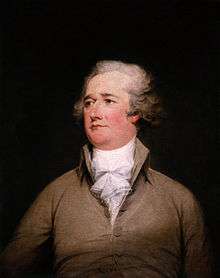Federalist No. 8

Federalist No. 8 is an essay by Alexander Hamilton, the eighth of The Federalist Papers. It was published on November 20, 1787 under the pseudonym Publius, the name under which all The Federalist Papers were published. In it, Hamilton argues for the utility of the Union to the well-being of Americans, specifically addressing the negative consequences if the Union were to collapse and conflict arise between the states. It is titled, "Consequences of Hostilities Between the States."
Essay Synopsis
If the states do not unify into a single nation there will be a perpetual cycle of conflict between neighboring states. Their alliances or dis-unions create circumstances similar to European nations, where the cycle of aggression between neighboring nations creates the need for domestic armies and fortifications. Additionally, if not unified populous states, motivated by greed might plunder weaker states for their resources.
The motivation for a union is safety, being aware though that no matter how great the nation's commitment to liberty freedoms are compromised in order to achieve protection. The physical damage of armed conflict compels nations to implement a military deterrent and in doing so an overly militaristic culture diminishes the civil and political rights of the people. "To be more safe, they at length become willing to run the risk of being less free."
The new Constitution does not prohibit standing armies and it is inferred that a perpetual army will exist. The frequency of conflict and the need for defense will necessitate a ready armed force for defense. And by its nature a militaristic state strengthens the executive arm (from which a monarchy could emerge). War increases executive authority at the expense of the other branches of government.
Extreme defense would likely give rise to oppressive government practices.
Observing history; the livelihood of citizens cause the population to be ill suited for war. A varied workforce necessitates the development of a profession of soldiers who would be distinct from the body of the citizens.
"The military state becomes elevated above the civil." Nations that don't have a full-time army are less likely to oppress citizens. The leaders of nations prone to invasion must maintain defensive forces, however frequently this militarism infringes upon the citizen's rights or weakens their sense of entitlement of those rights; the continental nations of Western Europe were examples of this.
Also, a Union of states would act as a deterrent from aggression by nearby Foreign colonies.
External links
| Wikisource has original text related to this article: |